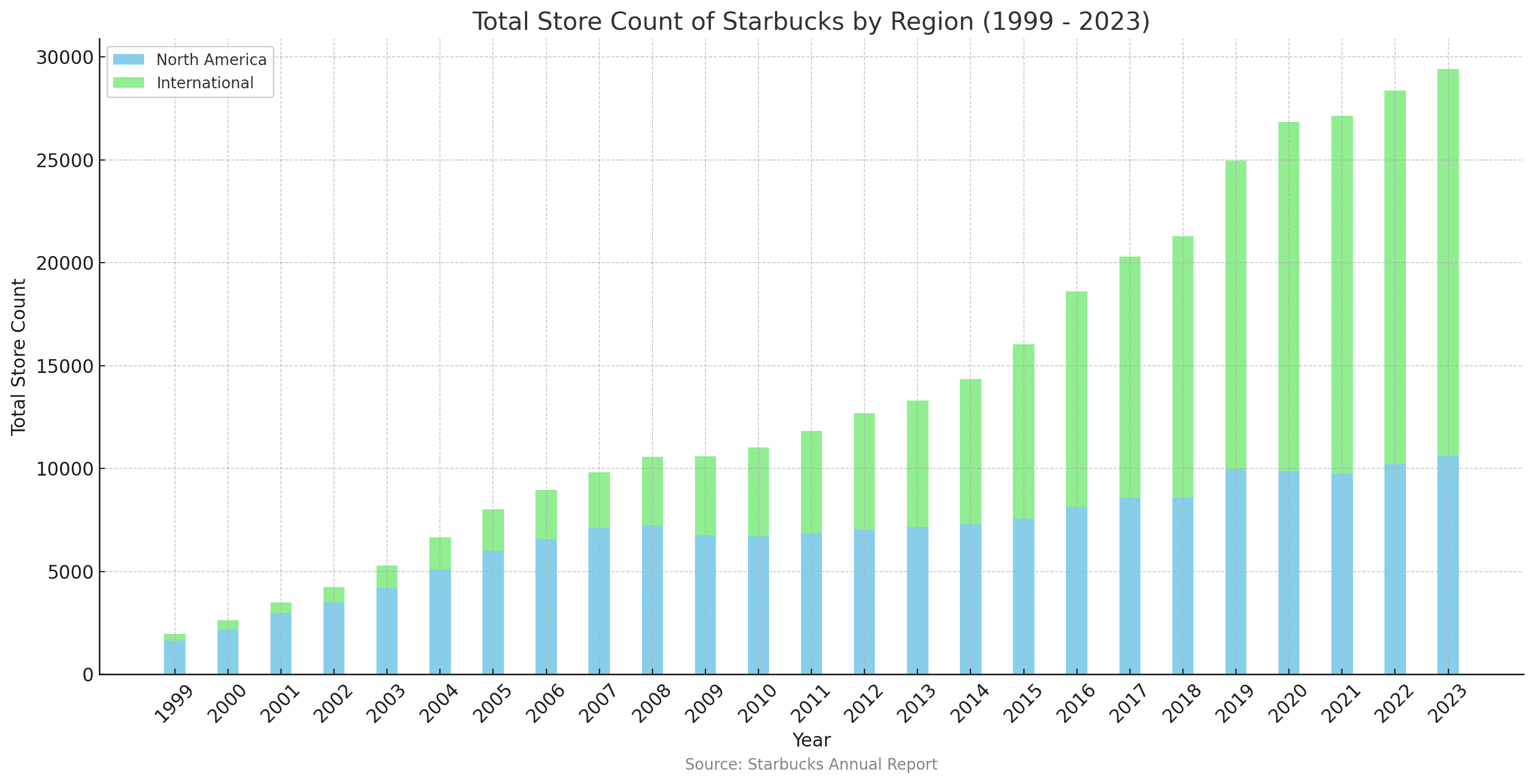Glimbora Insights
Starbucks' Global Expansion Strategy
Jun 12, 2024
Starbucks, the iconic coffeehouse chain, has achieved remarkable success in its global expansion, becoming a ubiquitous presence in over 80 countries. The company's strategy to conquer international markets is multifaceted, involving meticulous market research, strategic partnerships, and cultural adaptation. Here's an in-depth look at the key components of Starbucks' global expansion strategy.
Over the years, Starbucks has significantly expanded its store count in both North America and international markets. The chart below illustrates this growth, highlighting the increasing gap between the number of stores in North America and those in international markets. This disparity underscores Starbucks' aggressive expansion strategy domestically while simultaneously making substantial inroads into global markets. The consistent increase in both regions reflects the company's successful adaptation to diverse cultural preferences and effective market penetration strategies. By leveraging local partnerships and tailoring its offerings to meet regional tastes, Starbucks has managed to establish a strong global presence while maintaining its brand identity.

—
Market Research and Strategic Partnerships
Starbucks’ global expansion begins with thorough market research. The company meticulously analyzes potential markets to understand local consumer preferences, economic conditions, and cultural nuances. This research informs decisions on store locations, product offerings, and marketing strategies. For instance, before entering the Chinese market, Starbucks conducted extensive research to understand local tea-drinking habits and the growing middle class’s increasing openness to Western brands. This research-driven approach allowed Starbucks to tailor its offerings to local tastes, incorporating popular local flavors into its menu.
One of the core elements of Starbucks’ global strategy is forming strategic partnerships and joint ventures with local companies. These partnerships help Starbucks navigate regulatory challenges, understand local business environments, and leverage the established distribution networks of local partners. In China, Starbucks partnered with Alibaba to leverage its e-commerce platform and expand its reach, including the development of a pioneering virtual Starbucks store and delivery services through Ele.me. Additionally, Starbucks formed a joint venture with Tata Consumer Products in India to gain access to local distribution networks and consumer insights.
—
Cultural Adaptation and Innovation
Starbucks excels in adapting its brand to fit the cultural context of each market. This involves customizing store designs, product offerings, and marketing campaigns to resonate with local consumers while maintaining the core Starbucks brand identity. In Japan, Starbucks introduced seasonal beverages like sakura (cherry blossom) flavored drinks, which align with local traditions and festivals. In the Middle East, Starbucks stores incorporate local architectural elements and offer a menu that respects regional dietary laws.
Innovation is a critical component of Starbucks’ strategy, particularly in digital integration. The company leverages technology to enhance customer experience through mobile ordering, loyalty programs, and personalized marketing. In the United States and China, Starbucks has successfully integrated mobile apps with payment systems and loyalty programs, driving customer engagement and convenience. The Starbucks Rewards program, in particular, has been instrumental in building customer loyalty and increasing repeat visits.
—
Lessons in Global Branding from Starbucks
Starbucks’ global expansion strategy exemplifies a seamless blend of maintaining a consistent global brand identity while adeptly adapting to local cultures and preferences. This success stems from rigorous market research, strategic local partnerships, and a commitment to cultural customization. By leveraging technology and innovative digital integration, Starbucks not only enhances customer experience but also fosters loyalty across diverse markets. As Starbucks continues to evolve with changing global dynamics, its approach serves as a benchmark for other brands aspiring to achieve global prominence. This strategy highlights the importance of understanding and integrating into local markets while preserving the essence of the brand, ensuring continued relevance and connection with consumers worldwide.
Glimbora Insights





